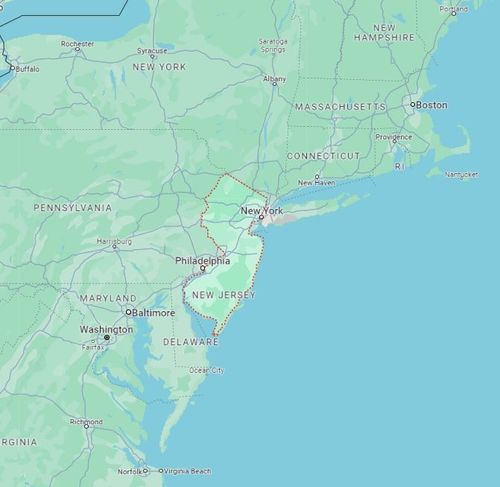New Jersey bill aims to create low carbon transportation fuel standard

SOURCE: Google Maps
February 1, 2024
BY Erin Voegele
Legislation introduced in the New Jersey Senate on Jan. 29 aims to establish a low-carbon transportation fuel standard (LCTFS) that would reduce the average carbon intensity (CI) of gasoline and diesel by 10% below a 2019 baseline by 2030. If signed into the law, the bill would create the first such clean fuel standard on the East Coast. Similar programs have already been implemented in California, Oregon and Washington.
The bill, titled the New Jersey Low Carbon Transportation Standard, or S. 2425, explains that the creation of a LCTFS is central to reducing the state’s greenhouse gas (GHG) emissions. In addition to reducing GHG emissions, the technology-neutral LCTFS would also incentivize the creation of jobs in a wide variety of sectors, including construction, agriculture, forestry and transportation while creating new markets for waste materials, such as municipal solid waste (MSW), manure, agricultural and forestry residuals and industrial emissions, according to the legislation.
The legislation directs the New Jersey Department of Environmental Protection to establish an annual LCTFS for gasoline, diesel and alternative programs, along with a program to implement and enforce the standards. Lifecycle GHG emissions for various fuels would be determined using the U.S. Department of Energy’s GREET model. Fuels eligible to participate in the program include, but are not limited to, ethanol, biomass-based diesel, renewable diesel, sustainable aviation fuel (SAF), electricity, biomethane, biogasoline, renewable natural gas (RNG), fuels from carbon capture and utilization, electrofuels, and hydrogen.
Advertisement
Fill It Up Clean New Jersey, a diverse coalition of businesses and community stakeholders, has spoken out in support of the bill, noting the program would improve access to clean transportation fuels and provide immediate environmental benefits to reduce pollution and protect the state’s air and water resources.
Additional information is available on the New Jersey legislature website.
Advertisement
Related Stories
The U.S. Department of Energy on May 30 released an updated version of its 45ZCF-GREET modeling tool to account for new feedstocks and methods of production, including ethanol from corn wet-milling and natural gas from coal-mine methane.
Editor's note from the Summer 2025 issue of Biodiesel Magazine
Legislation pending in the Illinois legislature aims to create a clean transportation standard (CTS) that would require a 25% reduction in in the lifecycle carbon intensity (CI) of ground transportation fuels within a 10-year period.
A notice published in the Federal Register by the U.S. EPA indicates that far fewer parties than originally anticipated have registered with the agency as biointermediate producers under the Renewable Fuel Standard.
Biomass Magazine has announced the dates for the 19th annual International Biomass Conference & Expo. The event is scheduled to be held March 31-April 2, 2026, in Nashville, Tennessee, at the Gaylord Opryland Resort & Convention Center.
Upcoming Events










